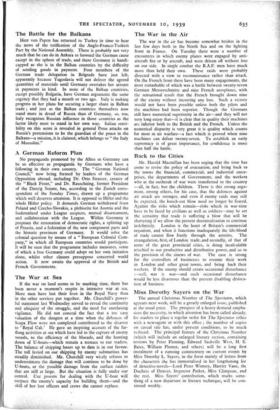Back to the Cities
Mr. Harold Macmillan has been urging that the time has come to revise the policy of evacuation, and bring back to the towns the financial, commercial, and industrial enter- prises, the departments of Government, and the workers who at the outbreak of war were transferred to the country —all, in fact, but the children. There is this strong argu- ment, among others, for his case, that the defences against air attack are stronger, and even if enemy raids may still be expected, the knock-out blow need no longer be feared. Against the risks which remain—risks which in war-time have to be faced by civilians as well as soldiers—may be set the certainty that trade is suffering a blow that will be shattering if we allow the present decentralisation to continue indefinitely. London is the heart of Britain's commercial organism, and when it functions inadequately the life-blood of trade cannot flow freely through the arteries. The strangulation, first, of London trade, and secondly, of that of some of the great provincial cities, is doing incalculable mischief to our productive and distributive power, and so to the provision of the sinews of war. The case is strong for the controllers of businesses to resume their work in London and other great towns, and bring back their workers. If the enemy should create occasional disturbance —well, war is war—and such occasional disturbance would be less disastrous than the present disabling disloca- tion of business.




































 Previous page
Previous page